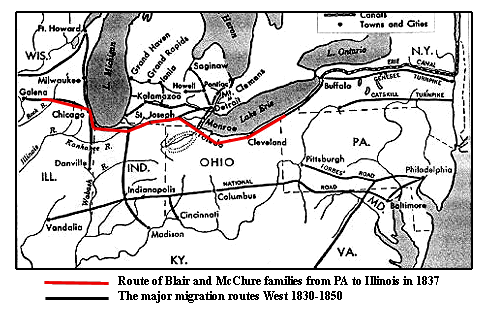Samuel Long Blair was born February 13, 1783 on
the banks of the Susquehanna River in Northumberland County, Pennsylvania. He was the
youngest son born to Samuel Blair and Mrs. Ann Young. When a young
man he moved, with his parents, to Crawford County in far western Pennsylvania. On
October 24, 1811 he was joined in marriage to Mercy Chidester at Lake Conneaut, PA.
Mercy Chidester was born December 2, 1791 in
Washington County, Pennsylvania. She was the daughter of Silas and Jane (Stuart)
Chidester. Her family had originally come from New Jersey and most of her ancestors
were early (mid 1600's) emigrants to America. Mercy's family had come
to Crawford County, PA about 1803 and settled on the shores of Lake Conneaut.
Soon after their marriage, Sam
fought as a Captain in the War of 1812.
Following the war Sam and Mercy settled on their own farm in Crawford County and started a
family. Eight children were born to them, starting with
Nancy
Hammond Blair who was born in 1814. Next came, William Stuart, Jane Chidester,
Samuel Long Jr. (1825-1827), Sarah Ann, Samuel Wilson, Silas Jackson
and finally John Franklin who was born in 1835.
In 1837 the economy of the country was
entering a deep depression and Sam probably feared for his sons future livelihood in
Pennsylvania so he sold out and headed West to the new and unsettled lands of
Illinois. The land in Northern Illinois was opening up to settlement
following the end of the Black Hawk war there. Land was selling for $1.25 an acre and with
a lot of hard work and a few years of hardship the possibilities were limitless for the
next generation of Blairs.

Sam, Mercy, their four sons, three daughters and
their son-in-law, William McClure, set out for Illinois in the middle of April 1837.
They came overland with two four-horse teams and one two-horse carriage. The journey
took the family 40 days. On the first day of June they occupied section 30 of
Maryland township in Ogle County, Illinois. They simply camped out in the vehicles,
under a large burr oak tree and set out to immediately construct a rough one room log
cabin. The studding was made of burr oak trees, scored and hewed to six inches square
and set sixteen inches apart. The logs were rough, not hewn. It was described as a
"homely affair with no conveniences, but covered and slightly sheltered a healthy
happy family."
The land they settled on was wild prairie, with
thick tough sod and grass 2 to 3 feet high. The soil was a black loam with almost no
rocks. Between the stretches of open prairie were stands of timber, an invaluable
resource to the pioneer. Large droves of deer would roam past the cabin daily and
one of the favorite pastimes of the little ones was trapping prairie chickens. For
several years prior to the railroad coming, the crops produced by the family had to be
hauled to Chicago a hundred miles away, a journey of several days in an ox
drawn wagon. On several occasions the family had the opportunity to trade a load of
produce for State street lots, now in the heart of the Chicago loop district, but they
declined the propositions.
Mercy died on the 19th of June in 1861 and
Samuel followed her to the grave a couple of months later on September 5th, 1861, two days
before his son and grandson marched off to fight in the Civil War. Sam and Mercy are
both buried in the Adeline Cemetery in Adeline, Ogle County, Illinois.
See the newspaper article on
Old-timer's reunion for a stirring description of pioneer life in
Ogle County.